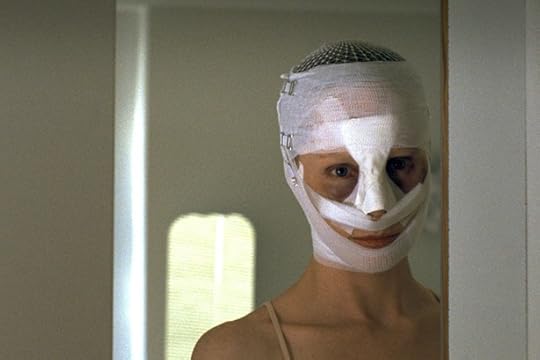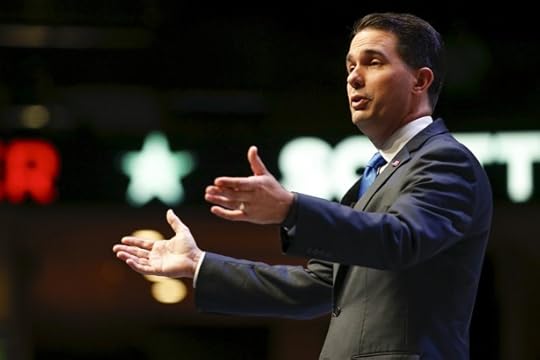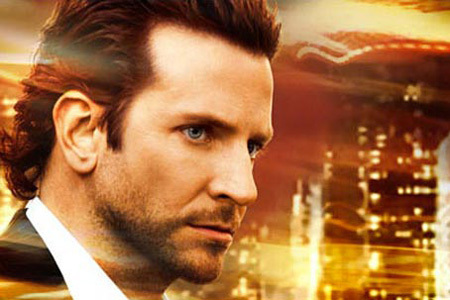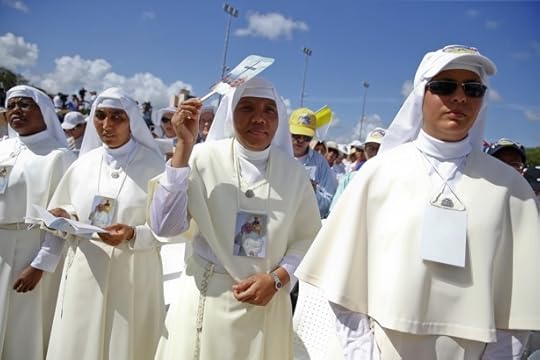Atlantic Monthly Contributors's Blog, page 341
September 22, 2015
Fresh off the Boat: Still Pretty Fresh

Sunday was, by most accounts, a good night for diversity in the television industry. Among a series of well-deserved Emmy wins (Transparent, Uzo Aduba, Regina King, Jill Soloway) came Viola Davis’s victory as the first black woman named best lead actress in a drama. Her speech offered some much-needed candor: “The only thing that separates women of color from anyone else is opportunity. You cannot win an Emmy for roles that simply are not there.” After some tears, the ceremony ended, and the bubble of optimism was punctured somewhat by the show that followed: 2 Broke Girls, a sitcom known for its bungling use of racial humor, often involving a Korean American restaurant owner. It served as an uncomfortable reminder of how much farther Asian Americans have yet to go on the small screen, even as more lead roles open up to them.
Related Story
‘Fresh Off the Boat’ Is Good—but It Could Be Even Better
ABC’s Fresh off the Boat, which returns for its second season Tuesday, didn’t get any Emmy love after its debut run (the snubbing of worthy comedies like Parks and Recreation prove the awards’ fallibility), but it’s also the kind of show that could conceivably push Asian Americans closer to a statuette. Its lead actress, Constance Wu, was praised for her breakout role as Jessica, the sharp-tongued but loving matriarch of the Huang family. And the show’s first season displayed some of the heart and charm that made Modern Family a long-running comedy favorite until Veep unseated it this year. If Fresh Off the Boat’s second season premiere is any indication, the show hasn’t made any drastic leaps in humor, quality, or ambition. But it looks like the series will continue to deliver consistent chuckles and cleverly subvert stereotypes of Asian American experience—even if they come wrapped in a fairly standard family-sitcom package.
That package, generally, is this: Eleven-year-old Eddie Huang moved with his family from Chinatown in Washington, D.C. to Orlando, Florida, where his father Louis (Randall Park) runs a Golden Corral-style steakhouse and his mom finds her calling as a real-estate agent (both parents emigrated from China). A hip-hop lover, Eddie struggles to fit into his new school while his younger brothers Evan and Emery have no trouble. Most episodes play off the conflict that arises between the family’s more traditional Asian values and roots and their American ones. But where the show succeeds is in showing how two sets of identities, seemingly at odds, can and do coexist, however messily. And it’s the kind of commentary that only a show with multiple Asian American characters can really achieve.
No, the show doesn’t get into some next-level cultural theory about identity politics, but it makes those types of questions accessible and relevant to an average American audience. Take the season-two premiere episode, “Family Business Trip,” for example: Louis tries to convince his wife that his trip to a business conference is not an attempt to sneak in some summer relaxation, because the family doesn’t “believe in vacations.” (As Louis tells one of his employees, “Your job is a vacation from poverty.”) It’s ostensibly making fun of how relentlessly hardworking immigrant families can be, until you remember—Americans are notoriously awful when it comes to taking a break from work, even when they’re offered paid leave to do so. In tapping into a stereotype, the show gets at another truth, and the joke becomes less “wow, how Asian” and more “wow, how American.”
Still, newcomers to the show are best off starting from the very beginning if they want to better appreciate the nuances of the Huang family’s dynamic. In this season’s premiere, Jessica’s lovable side doesn’t get as much attention, and there’s not much background about their stressful (but hilarious) collective efforts to get the restaurant off the ground. Also missing from “Family Business Trip,” and probably the rest of the season, is the voiceover narration from the real Eddie Huang, whose memoir served loosely as the basis for the show. Not that the show really needs him—but it’ll have to work a bit harder to bridge the gap between the interior world of younger Eddie (played by the delightful Hudson Yang) and the audience. Also gone is the sense of an adult looking back and reflecting on his childhood—instead, the show seems now fully its own thing, unmoored from the darker realism of Huang’s actual life story.
Much was made last season of Huang’s ambivalence about the show, mainly for its apparent whitewashing and neutering of his memoir.
I’m happy people of color are able to see a reflection of themselves through #FreshOffTheBoat on @ABCNetwork but I don’t recognize it.
— RICH HOMIE HUANG (@MrEddieHuang) April 8, 2015
But if some of the dissenting Twitter comments Huang received after calling the show unrelatable are any sign, Fresh Off the Boat is still managing to reach many. And at a time when a show as beloved as How I Met Your Mother only last year deployed yellowface, and when Asian actors still have little representation on TV, it’s nice to have another that lets Asian Americans characters define—and laugh at—themselves.









The Primal, Familial Fears of Goodnight Mommy

Stories where the monster and the victim are family make up a good chunk of the horror canon: The Shining, The Omen, The Exorcist, Rosemary’s Baby, A Tale of Two Sisters. Scarier than a creature bearing down on you from the outside—a ghost, a clawed nightmare-stalker, a masked serial killer—is the thought that the evil is sleeping in a sheer nightgown in the next bedroom over. And so despite the crowded cinematic field, the family at the center of Goodnight Mommy is, if nothing else, unhappy in its own way—a way that involves inhumanly large insects, a formaldehyde-soaked cat, and an inexplicably large pile of bones buried beneath the house.
Related Story
What the Hellish 'Babadook' Has to Say About Childhood Grief
Creepy props aside, the minimalist Austrian horror film focuses on just three main characters—a woman (Susanne Wuest) who returns home from having facial surgery to her young twin sons Elias and Lukas (played by actors of the same names). But something seems off about her to the boys—she’s more distant, she’s forgetful, she’s sleeping a lot, not to mention she cuts a terrifying figure with her bony frame and a head swathed in bandages. The three move like leashed animals throughout the house, tiptoeing around each other as the boys try to unmask her, both literally and figuratively. The result is a deeply sad, and at times intensely violent, parable about the love between a parent and child—and the horrifying consequences when that love appears to be lost.
Goodnight Mommy’s title—punched up for English-language audiences from its original German name Ich seh Ich seh (or I See I See)—cheapens the film’s highbrow aspirations. (It’s a great watch for those who think modern horror films are all rubbish.) Visually and tonally, it’s quite beautiful, a welcome break from the recycled, low-budget fare that’s recently been dominating the annual scary-movie menu. The story takes place in a gorgeous family home, but in the hands of directors Veronika Franz and Severin Fiala, the property’s stylish modernism and blog-worthy decor quickly start to feel oppressive as the house feels more prison-like. Like Stanley Kubrick in The Shining, Franz and Fiala expertly harvest the natural claustrophobia that can crop up even in a physically expansive setting. There are no neighbors for miles—instead, the family’s isolation is fortified by cornfields, a lake, a forest, and, sometimes, locks on the doors.
The film is most unsettling when it exploits the gaps in the audience’s knowledge, gaps that don’t initially seem to exist but that become apparent as the film turns darker. Why did the father leave? What are those mysterious phone calls about? Why does the mother pick on only one of the boys? And why is she stockpiling the basement freezer with a year’s worth of frozen pizza? Ambiguity trumps straight-up answers, lending the film the desired sophisticated vibe but also making it feel a little hollow. (There’s a twist in the third act, but like any good twist, it doesn’t come as a total surprise.)
Goodnight Mommy is great watch for those who think modern horror films are all rubbish.Goodnight Mommy isn’t all shadowy mystery—it delivers its share of explicit (and nauseating) violence and psychological torture. And some of the film’s most striking, disturbing imagery helped its trailer go viral as, per many outlets, the scariest ever made (quite a feat for a small, subtitled, foreign-language film). Yet the film is most admirable when you look at it as a dramatic, disturbing exploration of the mother-child relationship. All their mother’s little violations and aberrations from normal domestic life read, to the boys, like proof that she’s an impostor. Forgetting the name of one of her son’s favorite songs takes on mythic, tragic significance, and the bandages wrapped around her head seem to disfigure her—but in any other average horror movie, these things would hardly warrant a second glance, let along a gasp.
Tracy Moore noted at Jezebel how the film “doubles as a cautionary tale against modern motherhood, a disturbing metaphor for the way it demands relentless self-sacrifice and maddening consistency at a high price.” But like another recent stand-out foreign horror film, The Babadook, it has quite a bit to say about the child’s side of things. It’s hard not to watch the film and feel a sympathetic sting on the boys’ behalf when they’re banished to their room. Or to share their disbelief when their mom wildly searches their belongings for trash and contraband. Beneath it all is the nagging and heartbreaking feeling that these boys have lost their protector. That vulnerability—combined with their isolation, their confusion—can be harder to stomach than some of the more graphic scenes. For a film that includes, of all things, the most cringe-inducing application of Superglue perhaps ever committed to film, that’s saying something.









What's a Jew to Do When the Pope Comes on Yom Kippur?

A friend recently asked me if I think it’s selfish for Pope Francis to come to the United States during Yom Kippur. My answer was: No, probably not.
For one thing, the timing of his trip was pretty much set long before Francis became pope. He’s coming for the World Meeting of Families in Philadelphia, which his predecessor, Benedict XVI, promised to attend before he stepped down from the papacy. And he’s a busy guy; in traveling around the world to meet with Catholics, it would be difficult to schedule around every minority religious group’s conflicts.
Still, my friend has a point. The pope is making stops in D.C., New York, and Philadelphia—three of the most Jewish cities in the country. Traveling to see family, and even traveling within one’s own city, will be much more difficult because of traffic blockades. Symbolically, it feels like a moment of exclusion: On the day when the most powerful religious figure in the world meets with the most powerful political leader in the world in the White House, Jews will be unable to take part.
For its part, the Obama administration is aware of the awkwardness. On a call with reporters last week, the deputy national security advisor, Ben Rhodes, said the pope’s schedule wasn’t flexible, but “we were very focused on making sure the American Jewish community could be part of important interfaith efforts.” It’s hard to say what the pope is aware of, but he has long been a friend of the Jewish people. Back when he was just Bergoglio and not yet Francis, he began a friendship with the Argentine Rabbi Abraham Skorka; the two even co-authored a book featuring their conversations on subjects from the Arab-Israeli conflict to the Holocaust. He has spoken about the connections between Jews and Christians, saying in a 2014 interview that “inside every Christian is a Jew” and criticizing Holocaust deniers.
It has not always been this way. For example: Until 1959, the Latin word perfidis was used to describe Jews in the liturgy for Good Friday. While this word translates to mean “faithless” or “unbelieving," many misinterpreted it as meaning “perfidious.” Pope John XXIII had this word removed from the prayer.
Arguably, the most important change in the relationship between Jews and Catholics happened several years later in 1965, when the Second Vatican Council promulgated a document known as Nostra Aetate. This was the first time the Church had really made a statement on its relationship with the Jewish people—and the first time it formally declared that contemporary Jews can’t be held responsible for the death of Christ. Following the Holocaust and accusations of Christian anti-Semitism in Europe, this was a controversial and urgent first step toward reconciliation between the two religions.
That was 50 years ago. In the decades since Vatican II ended, popes have made pilgrimages to the Holy Land. A pope has visited Auschwitz and Yad Vashem. In 2015, a pope will visit the United States, the country with the second-biggest population of Jews in the world, on the Day of Atonement. He can be forgiven for that.









Kim Davis's Gay Friends

When the U.S. Supreme Court legalized gay marriage nationwide, county clerk Kim Davis stopped giving out marriage licenses—to anyone in Rowan County, Kentucky.
Between late June and early September, Davis refused to grant the documents to both straight and gay couples in the county. Her religious beliefs, she said, kept her from recognizing the kind of union the nation’s highest court now did. That included the unions of her gay friends.
“I can't put my name on a license that doesn't represent what God ordained marriage to be," Davis told ABC News’s Paula Faris in a new interview. She explained that her friendships could not change her stance on marriage.
Davis returned to her job last week after she refused a federal judge’s order to issue marriage licenses and was sent to jail, where she spent five days. Davis has vowed to not interfere with her deputies, who had been granting licenses in her absence. Davis, a Democrat, was first elected county clerk in November.
Davis told ABC News she didn’t expect to become so well-known. Supporters sent her fan mail and rallied outside the detention center where she was held. Republican presidential candidates Ted Cruz and Mike Huckabee even traveled to visit her there. When Davis emerged, she walked out onto a stage with her arms raised to the sky as Survivor’s “Eye of the Tiger” played.
“I’m just a normal person that has been touched by the grace of God, and his mercy,” Davis said. More from the interview:
Davis admits that she hasn’t always been a “good” person. She has been married four times and had children in an adulterous relationship, but she doesn’t consider herself a hypocrite.
“No, I’m forgiven,” she said. “Washed clean.”
Davis found God four and a half years ago, she said.
Davis believes that her Christian beliefs trump her day-to-day responsibilities.
“My constituents elected me. But the main authority that rules my life is the Lord,” she said.
Marriage licenses issued by Rowan County no longer carry Davis’s name. The documents state they are issued “pursuant to a federal court order.”









Ted Cruz Finds Few Late-Night Laughs With Colbert

A politician typically goes on a late-night comedy show so that he can deliver his message to a wide audience, banter with a friendly host, and generally prove to the world that he is, as Hillary Clinton might put it, “a real person.”
When Ted Cruz walked off stage after his appearance with Stephen Colbert on Monday night, he had accomplished none of those goals.
Colbert greeted his frequent conservative foil politely enough, but he then proceeded to give him the toughest interview of his brief tenure on CBS. Interrupting Cruz repeatedly, Colbert confronted him over his opposition to gay marriage, his selective adulation of Ronald Reagan, and his uncompromising political style. By the end of the appearance, the host had to step in to stop his studio audience from jeering the Republican presidential hopeful. “Now guys, guys, however you feel, he’s my guest, so please don’t boo him,” Colbert pleaded as Cruz began to give a boilerplate response on gay marriage. The crowd quieted.
The tension in the Cruz interview came during the second segment, when Colbert laid a bit of a trap for him by asking how the modern Republican Party could hold Reagan in such high esteem given that he raised taxes and signed legislation granting amnesty to undocumented immigrants. “Neither of those things would allow Ronald Reagan to be nominated today,” Colbert said. “So how can you truly emulate Ronald Reagan?” Noting—as Democrats frequently do—that Reagan repeatedly struck agreements with House Speaker Tip O’Neill, Colbert asked whether that’s what voters wanted—a president who would work across the aisle, delivering “action” rather than simply “principles.”
Cruz quickly launched into a defense of his reputation as a political fighter, saying he meets few voters who want more compromise with President Obama. And often on late-night shows, that would be enough. But Colbert cut him off twice, forcing him to say whether he supported Reagan’s tax increases and amnesty program. “No, of course not,” Cruz finally replied.
A few minutes later, Cruz had succeeded in turning the conversation back to his core campaign message—well, almost. “What I’m fighting for are simple principles,” he began. “Live within our means. Stop bankrupting our kids and grandkids. Follow the Constitution.”
“And no gay marriage,” Colbert added.
Uh oh.
“And no gay marriage,” Colbert repeated, as a way of showing he did not mean the interruption as a throw-away laugh line.
Cruz began to give his standard talking points on why he opposed the Supreme Court’s decision earlier this year. But he slipped up, and Colbert caught it. “Under the Constitution, marriage is a question for the states,” Cruz said.
“Marriage isn’t mentioned in the Constitution,” Colbert corrected him, to the crowd’s delight. Cruz quickly clarified himself, arguing that marriage should be governed not by the 14th amendment’s guarantee of equal rights and due process but by the 10th amendment, which says that any powers not given to the federal government are reserved for the states and the rights. Therefore, marriage should be a question for the states.
It was a decent recovery, but Cruz had lost the audience. Colbert’s exhortation not to boo kept them in line, and he ended the interview a minute later.
Cruz deserves credit for making the appearance. He’s a Republican who often seeks out safer audiences, whether on Fox or conservative talk radio. And it’s no longer a secret that Colbert is a much more challenging interviewer in his new show than any of his late-night colleagues. Donald Trump and Hillary Clinton each had far easier appearances with Jimmy Fallon last week. (Trump goes on Colbert’s show on Tuesday.) Carly Fiorina appeared on The Tonight Show opposite Cruz on Monday, and while Fallon did get her to respond to Ben Carson’s comments on Muslims and the presidency, it was a much lighter affair.
Yet even by Colbert’s standards, his interview with Cruz featured much tougher treatment than any of his other political interviews to date. When he hosted Jeb Bush on his debut show, he mixed in some serious queries with a number of gags. Colbert steered almost completely clear of politics in his moving interview with Biden. And when Bernie Sanders appeared on the show last week, Colbert gave him space to deliver his campaign talking points with little interruption.
Indeed, Colbert seems to be developing a habit of revealing his attitude toward a politician in the different ways he shows them off his stage. Concluding his interview with Bush, he told him, by way of a compliment, that he might possibly vote for him. Colbert said goodbye to Biden by practically pleading with him to run for president. With Cruz, there were no deadpan, and no praise. “I really appreciated you sharing your views with us,” Colbert said, “and good luck with the campaign.”









September 21, 2015
Why Scott Walker Isn't Running Anymore

When a lackluster Scott Walker walked off stage after the Republican primary debate last week, his supporters had one question: What was he thinking?
The Wisconsin governor gave one answer on Monday, when he announced he was ending his campaign for the Republican presidential nomination.
“As a kid, I was drawn to Ronald Reagan because he was a Republican and a conservative. Most of all, I admired him because of his eternal optimism in the American people,” Walker told his supporters at a hotel in Madison, Wisconsin. “That thought came into my head when we were all standing on the stage at the Reagan Library last Wednesday.”
That debate, Walker said, had “drifted into personal attacks,” and away from “the basics of our party.”
“I believe that I'm being called to lead by helping to clear the field in this race so that a positive conservative message can rise to the top of the field,” he said. “With this in mind, I will suspend my campaign immediately.”
News of Walker’s exit was first reported by The New York Times.
Walker appeared to be the perfect candidate when he announced his run in mid-July. He had a strong record of winning elections, he was polling well in Iowa, impressing conservative activists, and wooing powerful donors. Then came the dog days of summer and Donald Trump, whose “caricature of a strong-willed populist conservative overwhelmed Walker’s chances at effectively running as a real strong-willed populist conservative,” as my colleague David Graham puts it. Other outsiders, like neurosurgeon Ben Carson, pushed Walker further into the background. Walker did some of that pushing himself, thanks to a handful of flip-flops and gaffes, particularly on foreign policy. One example: his comparison of Islamic State militants to union protesters in Wisconsin.
By September, Walker had sunk in the polls. Donors were itching for him to make some staffing changes in an attempt to reenergize the campaign. He didn’t crush either of his debate appearances, and he barely spoke at last week’s event. The latest national survey put him at less than 1 percent.
Walker follows former Texas governor Rick Perry, who ended his campaign on September 11. On Monday, Walker gave candidates who remain in the race a small piece of advice: Get out.
“I encourage other Republican presidential candidates to consider doing the same, so that the voters can focus on a limited number of candidates who can offer a positive, conservative alternative to the current frontrunner,” Walker said, referring to Trump. “This is fundamentally important to the future of the party and more importantly to the future of our country.”
The man who seemingly drove Walker out of the race tweeted about the governor Monday night.
“He’s a very nice person,” Trump said, “and has a great future.”









The Limited Originality of Limitless

What if you took a drug that gave you instant photographic recall of every memory you’d ever had? What might you accomplish with that power? The 2011 film Limitless saw its pill-popping hero use brain-enhancing drugs to make money, cavort with women, and run for political office. Meanwhile, the protagonist of the new TV show Limitless, a quasi-sequel to the film, gets his hands on the drug and uses it to solve some fairly boring mysteries. With this new series, CBS seems to have squandered the potential of a weird, compelling premise by cramming it into an average procedural crime-show mold.
Related Story
'Limitless,' Oprah, and Charlie Sheen: The Scary Side of Super-Sized Ambition
Like many CBS dramas, Limitless is made with aggressive competence. There’s a cinematic sheen borrowed from Neil Burger’s film, which starred Bradley Cooper and was enough of an unexpected hit to spawn this spinoff. There’s a brief cameo from Cooper himself as now-Senator Eddie Morra, who gives his blessing to his successor Brian, a struggling musician played by Jake McDorman who starts popping the magic pill NZT and draws the attention of the FBI. But there’s a depressing lack of originality to Limitless, which quickly positions itself as a dull cop show despite its wackier sci-fi origins.
As one might discern from the title, there are many directions Limitless could take to explore the powers NZT bestows and their consequences. Aside from granting complete memory recall, the drug’s powers are vaguely defined and can seemingly offer whatever the taker desires (in the film, it ranges from literary success to political acumen). But Brian takes about as narrow an approach as possible. At one point, he uses his new powers to pick a lock; as the show’s self-serious narration tells us, he learned that skill by watching a random YouTube video years ago, and NZT finally granted him the power to deploy it.
At another point, Brian manages to identify the rare genetic disease his father (Ron Rifkin) has by sorting through his own family tree like a walking Ancestry.com. That’s the incredible power of NZT, according to CBS’s Limitless: You can instantly tap into the power of any major website in your day-to-day life, no subscription required. By the time Brian uses his powers to predict just how long it would take a subway train to brake without hitting him if he jumped on the tracks, you’ll be begging for him to lose his bottle of medicine.
Limitless also misses the opportunity to set up some kind of interesting conflict surrounding Brian’s drug use. In the film, Eddie takes the pills but has to deal with side effects like massive memory loss. For the show, there’s no apparent downside: Any issues have been breezily worked out so Brian can be a more effective crime-fighter for the Feds. Once he gets hooked on the pills, he’s noticed by the government as a good detective, and partners up with Agent Rebecca Harris (Jennifer Carpenter, best known as Dexter’s sister). There are only brief references made to the depths of the NZT conspiracy: figuring out who made it, and why Brian resists its side effects.
But this is a CBS procedural, and viewers can rest assured that mystery will simmer on the back-burner for as long as possible. As other networks scrabble to find the right balance of big-name stars and live-TV events to keep viewers tuning in, CBS isn’t wavering from its successful programming model one bit. Almost all of its dramas see lawyers or cops solving cases, and next to none prioritize long-term storytelling over syndication-friendly crimes of the week. This format usually requires no originality; it speaks volumes that the closest comparison to Limitless is the former CBS hit The Mentalist, which was about a fraudulent psychic who was able to figure out people’s backstories and tell if they’re lying by reading their speech and facial tics.
Even the brief appearance of Cooper on the show doesn’t help much. 2011’s Limitless was far from a perfect film, but it was the first indicator that Cooper could carry a sub-par script on the back of his growing star power. When he drops into the show, sporting the same electric-blue irises he had in the movie (another NZT side effect), you want the plot to follow him on whatever dangerous new mission he’s embarking on, be it a presidential campaign or the creation of a secret society (he hints vaguely at both). Cooper is there to lend the series legitimacy, but in the end he only highlights what it’s so sorely lacking: a protagonist, and overarching plot, for the audience to care about.









Minority Report and the Drawbacks of Foresight

In stories about people with mystical foresight, the drawbacks of divination are often more important than the benefits. Cassandra, after all, did not live happily ever after. See the future? Who wants that, really?
The world of Fox’s Minority Report is one that has apparently learned this lesson all too well. A program known as “Precrime” harnessed the power of three mentally gifted individuals—“precogs”—to stop murders before they happened. But it was discontinued sometime before our story begins in 2065. The show’s pilot doesn’t inform you of what went wrong with Precrime, but if you’ve seen Steven Spielberg’s 2002 film Minority Report, an adaptation of a Philip K. Dick short story and the prequel for this new TV show, you get it. Or if you have moral questions about the downsides of preemptive warfare, stop-and-frisk, criminal profiling, and other kinds of anticipatory uses of force by the government, you probably get it.
The main cop in Minority Report, though, does not get it. “Can you believe we used to stop this stuff before it happened?” the detective Lara Vega (Meagan Good) complains while looking over a crime scene. “All we do is mop up messes,” a partner replies. Later, she chats with a politician who previously oversaw the catch-em-before-they-kill efforts and now wants to recreate the program with algorithms instead of ESP, and we learn that it was Precrime that attracted Vega to law enforcement. Which is to say, maybe she wanted an easier gig than the one she now has (even though 2065 detectives are conveniently tricked out with computerized contact lenses, mini surveillance drones resembling Harry Potter’s Golden Snitches, nifty stun guns, and the like).
For a while, it appears that the show may subscribe to Vega’s unconflicted affection for predictive policing—which would have represented an unconscionable betrayal of its source material’s ideals. But there are hints throughout Minority Report’s pilot that the picture may end up being more complicated. The characters visit a ward for those incarcerated under the Precrime regime, all of whom now have mental problems due to their treatment by the government. A big bad plot that must be foiled results from resentments born of throwing people in jail for crimes they didn’t commit. And perhaps most damning, when Vega wants to play some “oldies” at home, she puts on an Iggy Azalea record. Clearly, her mind is not quite right.
But so far, the most important downside of foresight is of the personal kind, the psychologically trying kind. The second star of the show is Dash (Stark Sands), one of the three telepathic siblings who were released to a life of anonymous freedom once the Precrime program ended. For a decade, he was hooked into a machine, spouting out grim prophecies; now that he’s in the wild, the visions haven’t ended but have become patchier. Which is to say, he still sees future murders but is no longer equipped to stop them. The guilt—not to mention the interruptions to his day when images of stabbings and shootings enter his mind—sends him back toward helping law enforcement, where Vega teams up with him while vowing not to reveal his true identity.
While portraying a sleek future of advanced technology, the show is clunky.The dynamic that results is familiar but, on paper at least, compelling. Dash can’t help but blurt out his premonitions, yet he doesn’t want to be outed as psychic. Vega pushes him for more and more info, which can only be obtained by him crossing certain personal lines. At various points, Dash visits with his gifted brother and sister, who want no part of working for the powers that be. The levels of moral hazard here are intriguing, as are the story’s connection with present-day issues around justice and safety.
But the show itself, while existing in a sleek future of advanced technology, is a bit clunky. It hews to the most obvious tropes of case-of-the-week shows about oddball visionaries partnered with law-and-order sharpshooters, and in the first hour at least, doesn’t pay its audience much respect when it comes to the plausibility of dialogue, character motivations, or the security procedures at a mental institution for former future-convicts. The shoddiness is typical of many a canceled network procedural, and probably won’t make viewers confident the show will competently execute upon the rich potential of its premise. Then again, no one knows the future, thank goodness.









To All Nuns and Sisters: Pope Francis Says Thank You

As the pope makes his way toward the United States, it will be interesting to hear how he talks about the role of women in the Church—and in particular, nuns and women religious. Over the past several years, the Vatican has had a tense relationship with North American nuns and women religious: One of their major organizing bodies got chided by the Church for allegedly flouting Catholic teachings.*
Even though it’s unlikely, basically to the point of impossible, that Pope Francis will take up the question of whether women should be allowed to be priests and take other leadership roles, he has made a point of praising the good that women do in the Church. On Sunday, in an unscripted homily, he openly praised the way consecrated women serve the Church—after a bit of saltiness.
“God free us from crybaby nuns who are alway lamenting,” he said. “This phrase isn’t mine. St. Theresa said this to her nuns. It’s a phrase of hers. Woe to that nun who goes about all day lamenting because I suffered an injustice.”
This was mostly a message to young people who might be just starting out—he encouraged the women to get down with “the least ones,” as Jesus would say. “How wonderful it is for God, and how much good it does to a person, for example the smile of someone with muscle spasms who doesn’t know how to do it,” he said. “Or when they want to kiss you and they slobber on your face. This is the tenderness of God.”
Above all, though, he thanked them: the women who sit with the sick, hang out with the poor, and care for the “these least ones.”
“You can’t start a business, you can’t make money, absolutely nothing constructive is brought forward, so to speak, with these brothers and sisters of ours, with these least ones, with the smallest,” he said. “Thank you and thank you to all men and women consecrated who do this.”
Pope Francis’s Advice to Existentially Sad Millennials

Veterans of the pope beat often talk about how to cover Francis, and there’s one piece of advice they always give: When this pope looks up from his prepared comments and says something along the lines of, “I’m going to speak from the heart,” that’s when you know things are about to get spicy.
On Sunday, Francis was in full improvisational form. In the evening, during vespers with a group of seminarians, priests, and men and women religious, he free-styled for about 20 minutes about the meaning of mercy and unity. Afterwards, as he was meeting with a crowd of young people in Havana, he went off-script again.
“You are standing up and I am sitting. How unmannerly,” he said after getting introduced by a teenaged-looking boy (thus achieving the dream of every 78-year-old public speaker addressing a plaza full of young people—he got a laugh). “But you know why I sit down? It’s because I took some notes.”
What proceeded was a litany of advice that you’d only get from the most badass grandfatherly figure. For example (all quotes below are drawn from the Vatican’s official English translation):
To those who have given up on their dreams: “In Argentina, we say, ‘Don’t be wimpy.’”
To the cynics: “If I find a young person without hope, I’ve said this before, ‘a young retired person.’ There are young people who seem to have retired at 22 years old.” Another laugh moment. “They are young people with existential sadness, they are young people who have committed their lives to a basic defeatism.”
To the religiously persnickety: “When a religion becomes a ‘little convent’ it loses the best that it has, it loses its reality of adoring God, of believing in God. It’s a little convent of words, of prayers, of ‘I’m good and you’re bad,’ of moral regulations.”
He also spoke about the modern world’s “throw-away culture,” something that has come up repeatedly in his speeches and writings. “The youth become part of the throwaway culture and all of us know that today, in this empire of the god money, things are thrown away and people are thrown away.”
This, of course, includes the unborn. “Children are thrown away, because they are unwanted, because they kill them before they are born, the elderly are thrown away—I’m speaking of the world in general—because they don’t produce anymore.”
For those “existentially sad” young people, Francis had one more piece of advice: “be capable of creating social friendship.”









Atlantic Monthly Contributors's Blog
- Atlantic Monthly Contributors's profile
- 1 follower












